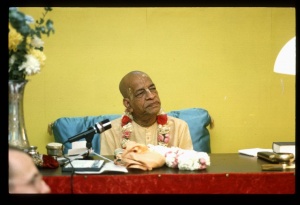CC Madhya 19.96: Difference between revisions
m (1 revision(s)) |
No edit summary |
||
| Line 1: | Line 1: | ||
{{ | [[Category:Sri Caitanya-caritamrta - Madhya-lila Chapter 19|C096]] | ||
<div style="float:left">'''[[Sri Caitanya-caritamrta|Śrī Caitanya-caritāmṛta]] - [[CC Madhya|Madhya-līlā]] - [[CC Madhya 19|Chapter 19: Lord Śrī Caitanya Mahāprabhu Instructs Śrīla Rūpa Gosvāmī]]'''</div> | |||
<div style="float:right">[[File:Go-previous.png|link=CC Madhya 19.95|Madhya-līlā 19.95]] '''[[CC Madhya 19.95|Madhya-līlā 19.95]] - [[CC Madhya 19.97|Madhya-līlā 19.97]]''' [[File:Go-next.png|link=CC Madhya 19.97|Madhya-līlā 19.97]]</div> | |||
{{CompareVersions|CC|Madhya 19.96|CC 1975|CC 1996}} | |||
{{RandomImage}} | |||
==== TEXT 96 ==== | ==== TEXT 96 ==== | ||
<div | <div class="verse"> | ||
śrutim apare smṛtim itare bhāratam anye bhajantu bhava-bhītāḥ | :śrutim apare smṛtim itare bhāratam anye bhajantu bhava-bhītāḥ | ||
aham iha nandaṁ vande yasyālinde paraṁ brahma | :aham iha nandaṁ vande yasyālinde paraṁ brahma | ||
</div> | </div> | ||
| Line 12: | Line 16: | ||
==== SYNONYMS ==== | ==== SYNONYMS ==== | ||
<div | <div class="synonyms"> | ||
''śrutim''—Vedic literature; ''apare''—someone; ''smṛtim''—corollary to the Vedic literature; ''itare''—others; ''bhāratam''—the Mahābhārata; ''anye''—still others; ''bhajantu''—let them worship; ''bhava-bhītāḥ''—those who are afraid of material existence; ''aham''—I; ''iha''—here; ''nandam''—Mahārāja Nanda; ''vande''—worship; ''yasya''—whose; ''alinde''—in the courtyard; ''param brahma''—the Supreme Brahman, Absolute Truth. | |||
</div> | </div> | ||
| Line 19: | Line 23: | ||
==== TRANSLATION ==== | ==== TRANSLATION ==== | ||
<div | <div class="translation"> | ||
Raghupati Upādhyāya recited, “Those who are afraid of material existence worship the Vedic literature. Some worship smṛti, the corollaries to the Vedic literature, and others worship the Mahābhārata. As far as I am concerned, I worship Kṛṣṇa’s father, Mahārāja Nanda, in whose courtyard the Supreme Personality of Godhead, the Absolute Truth, is playing.” | Raghupati Upādhyāya recited, “Those who are afraid of material existence worship the Vedic literature. Some worship smṛti, the corollaries to the Vedic literature, and others worship the Mahābhārata. As far as I am concerned, I worship Kṛṣṇa’s father, Mahārāja Nanda, in whose courtyard the Supreme Personality of Godhead, the Absolute Truth, is playing.” | ||
</div> | </div> | ||
| Line 26: | Line 30: | ||
==== PURPORT ==== | ==== PURPORT ==== | ||
<div | <div class="purport"> | ||
This verse recited by Raghupati Upādhyāya was later included in Śrī Rūpa Gosvāmī’s Padyāvalī (126). | This verse recited by Raghupati Upādhyāya was later included in Śrī Rūpa Gosvāmī’s ''Padyāvalī'' (126). | ||
</div> | </div> | ||
__NOTOC__ | |||
<div style="float:right; clear:both;">[[File:Go-previous.png|link=CC Madhya 19.95|Madhya-līlā 19.95]] '''[[CC Madhya 19.95|Madhya-līlā 19.95]] - [[CC Madhya 19.97|Madhya-līlā 19.97]]''' [[File:Go-next.png|link=CC Madhya 19.97|Madhya-līlā 19.97]]</div> | |||
__NOTOC__ | |||
__NOEDITSECTION__ | |||
Revision as of 12:51, 2 September 2021

A.C. Bhaktivedanta Swami Prabhupada
TEXT 96
- śrutim apare smṛtim itare bhāratam anye bhajantu bhava-bhītāḥ
- aham iha nandaṁ vande yasyālinde paraṁ brahma
SYNONYMS
śrutim—Vedic literature; apare—someone; smṛtim—corollary to the Vedic literature; itare—others; bhāratam—the Mahābhārata; anye—still others; bhajantu—let them worship; bhava-bhītāḥ—those who are afraid of material existence; aham—I; iha—here; nandam—Mahārāja Nanda; vande—worship; yasya—whose; alinde—in the courtyard; param brahma—the Supreme Brahman, Absolute Truth.
TRANSLATION
Raghupati Upādhyāya recited, “Those who are afraid of material existence worship the Vedic literature. Some worship smṛti, the corollaries to the Vedic literature, and others worship the Mahābhārata. As far as I am concerned, I worship Kṛṣṇa’s father, Mahārāja Nanda, in whose courtyard the Supreme Personality of Godhead, the Absolute Truth, is playing.”
PURPORT
This verse recited by Raghupati Upādhyāya was later included in Śrī Rūpa Gosvāmī’s Padyāvalī (126).